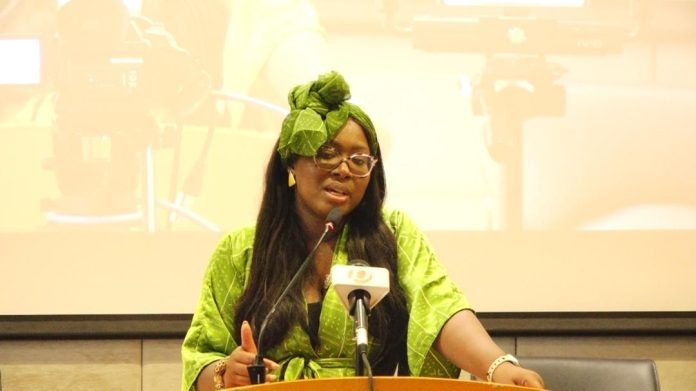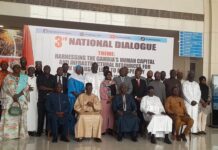By Fatou Dahaba
Dr. Satang Nabaneh, a prominent academic scholar and author, addressed ten contextual challenges such as weak institutions, compromised leadership, agriculture, constitutional framework, education system, security, and public health during Dr. Saja Taal’s inaugural lecture on Democracy and Development. The lecture aimed at exploring ways to construct a New Gambia and took place at the Sir Dawda Kairaba Jawara International Conference Center on Friday.
The public lecture The Center for Research and Policy Development (CRPD) organized honors the legacy of the late Academic and Thought Leader Dr. Alieu Badara Saja Taal.
The lecture, delivered by Dr Satang Nabaneh, an award-winning Gambian legal scholar and human rights practitioner, seeks to navigate the terrain of democratic consolidation while reengaging with republicanism’s principles.
The inaugural lecture delves into how democratic values are recognized, restored, consolidated, and preserved through constitutional change. It also focuses on what a New Gambia must do and what Gambians must avoid to prevent a relapse into “the dark years.”
Delving into the issues one after the other, Dr. Nabaneh said the country’s weak leadership continues to serve as a critical roadblock to Gambia’s National Development.
“There’s a need to hold the government system right, and there’s a need to reform our judicial system. The judicial system was corrupted during the Jammeh regime. And the Gambianizing of the judicial is one of the progressive things during the transitional period because the judicial is an active player in ensuring that the country’s democracy is protected.”
On compromise leadership, the double PhD holder pointed out that The Gambia is at a point where it does not need only strong or capable leadership but ethical leadership, which is the cornerstone of any successful nation.
“Part of our challenge is not that our leaders do not have ideas, but I do think that part of it is that we do have leaders who came into position accidentally, which also provides forces. Our leadership capacity needs training for someone new to power who knows what it takes to be an ethical and inclusive leader. The inclusion will include women and children and economic development, particularly gender equality. Looking at the disadvantages women face, there is under-investment in human capital, which includes women and children. Initiatives are not happening fast, sustainably, and efficiently.”
She said that much work has been done on the public delivery service system, especially by civil society organizations, to hold the government accountable for ensuring that public services are efficient, responsive, and corrupt-free.
Regarding Gambia’s education system, Dr. Nabaneh stressed that the curriculum needs to be upgraded and is not fit for purpose, acknowledging that mentorship continues to be one of the significant barriers and challenges in the education system.
On agriculture, she said a nation that cannot feed itself is at the mercy of external forces, and if the majority of foods consumed by the people are imported, inflation will continue to rise.
“Part of the problems affecting our agricultural sector is outdated farming practices, including low pay and time consumption. So you must invest in farming if you want young people to be farmers.”
Regarding public health and financial insecurity, the veteran scholar said the healthcare system does not address its needs but marginalizes the most vulnerable.
Commenting on drugs, she said drug is a serious issue in the country, and there’s a need for a holistic approach, especially in the increase of accessibility to both unregulated cocaine and also hard drugs.
“It is indicated how the Gambia is a transit point for hard drugs, and this should be seen as a national issue as it affects young people at most and their mental health.”
She recommended a strong, well-trained, and resourced civil society to hold the government accountable and tolerant in the Gambia context. This will promote a culture of health and respectful debate and dialogue that will provide a space for people to disagree and agree.
This inaugural lecture offers an opportunity to explore democratic consolidation while reaffirming republicanism’s principles. It examines how democratic values can be acknowledged, restored, consolidated, and preserved through constitutional changes and strengthening.
It also provides a platform for intellectual discourse and reflection on democracy and Development in The Gambia. As an initiative of the Center for Research and Policy Development, the lecture inspires individuals and communities to actively participate in the future of the Gambia through informed dialogue and civic engagement, ideals championed by Dr Taal during his lifetime.
Dr Alieu Badara Saja Taal was a renowned Gambian intellectual and senior lecturer in political science at the University of The Gambia (UTG). He was instrumental in establishing the UTG and contributed to its strategic planning and curriculum development. He also helped establish the UTG Students Service-Learning Association (UTGSSLA), a group of young intellectuals interested in enriching their academic lives by engaging in meaningful hands-on service to the community.
The late Dr Taal passed on 2nd April 2014. He mentored many students and youth activists in the Gambia, including the co-founders of CRPD.






